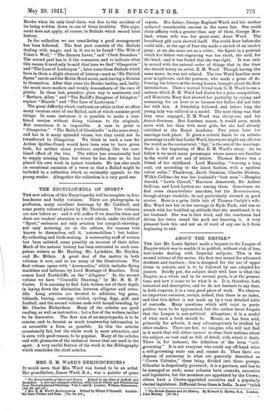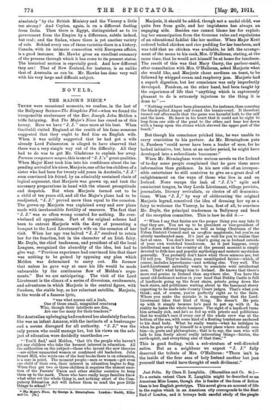ABOUT THE EMPIRE.* THE late Mr. Louis Spitzel made a
bequest to the League of Empire which was to enable it to publish, without risk of loss, text-books dealing with Imperial subjects. This is the second volume of the series; the first was meant for advanced students and teachers ; this is designed for the use of upper forms in schools, and is to be followed by one adapted for juniors. Briefly put, the subject dealt with here is what the Empire, as a whole and in its several parts, is at the'present time, and how it came to be what it is. It is, therefore, both historical and descriptive, and we do not hesitate to say that, in both respects, it is a very good piece of work. We observe no important omission, except, indeed, that there is no index, and that this defect is not made up by a very detailed table of contents. Many questions which still exist in party politics have to be approached, but the author never forgets that the League is non-political. Altogether; it is a model of what such a book should be. Meant, as has been said, primarily for schools, it may advantageously be studied by other readers. There are few, we imagine, who will not find in it much that will either correct or clear their notions about the subject, so vast and so full of detail, with which it deals. There is, for instance, the definition of the term " self- governing." It is not everyone who could say off-hand what a self-governing state can and cannot do. Then there are degrees of autonomy in what are generally described as "Crown Colonies," these being divided into three groups, Gibraltar is despotically governed ; it is a garrison, and has to be managed as such; some colonies have councils, executive and legislative, but the members are appointed by the Crown ; others have a Crown-appointed executive and a popularly elected legislature. Different from theee is India. Is not "ruled
• Tits British Empire audits History. By Edward O. Hawke, B.A. London: John Murray. [Ss. ed.]
absolutely " by the British Ministry and the Viceroy a little too strong ? • And Ceylon, again, is on a different footing from India. Then there is Egypt, distinguished as to its government from the Empire by a difference, subtle indeed, but real ; and the Sudan, where there is yet another variety of rule. Behind every one of these varieties there is a history. Canada, with its intimate connection with European affairs, is a good instance. Mr. Hawke gives en excellent summary of the process through which it has come to its present status. The historical section is especially good. And how different they are ! That of New Zealand, for instance, is as unlike that of Australia as can be. Mr. Hawke has done very well with his very large and difficult subject.









































 Previous page
Previous page